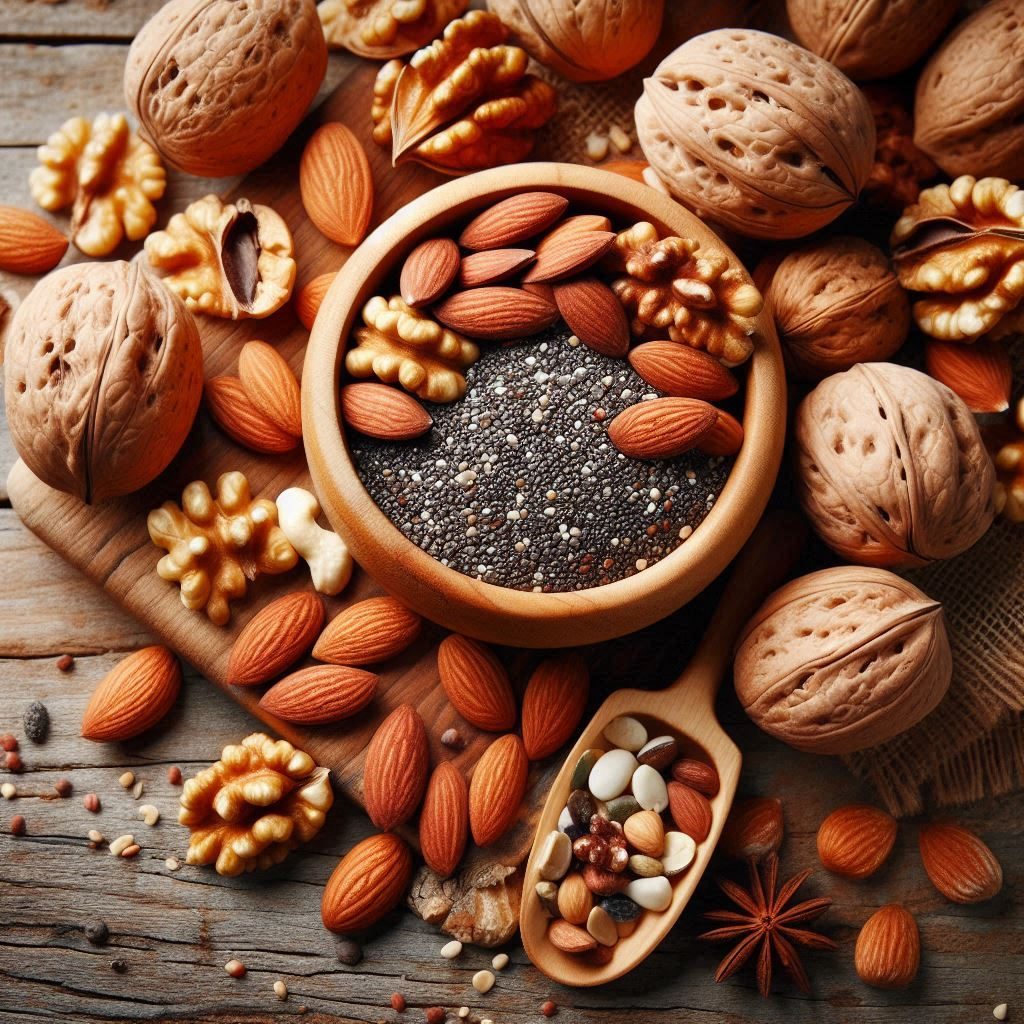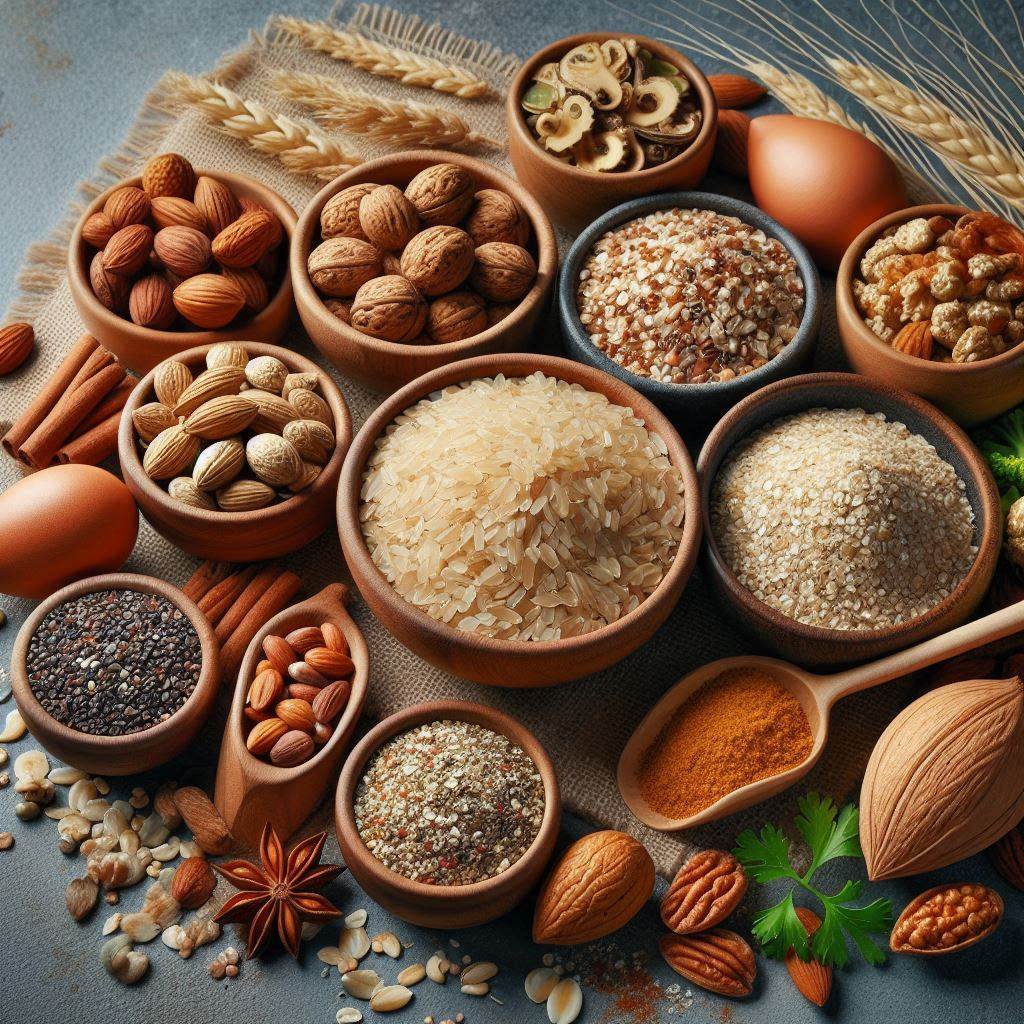

50 & Fit: Top Natural Foods for a Healthy You
As we age, our bodies undergo a myriad of changes that can affect our overall health and well-being. After turning 50, it becomes increasingly important to pay attention to our dietary choices. The foods we consume can significantly impact our energy levels, cognitive function, and even the risk of chronic diseases. In this article, we will explore six natural foods that should be incorporated into your daily diet after reaching the milestone of 50 years. These foods are not only nutritious but also delicious, making them easy to enjoy as part of a balanced lifestyle.

Nutritional Benefits
Leafy greens such as spinach, kale, and Swiss chard are packed with essential vitamins and minerals. They are rich in vitamins A, C, K, and several B vitamins, as well as minerals like calcium, iron, and magnesium. These nutrients play crucial roles in maintaining bone health, supporting immune function, and promoting healthy skin.
Antioxidant Properties
One of the standout features of leafy greens is their high antioxidant content. Antioxidants help combat oxidative stress in the body, which can lead to chronic diseases and accelerate aging. By incorporating leafy greens into your daily meals, you can enhance your body’s ability to fight inflammation and protect against cellular damage.
Easy Incorporation into Meals
Adding leafy greens to your diet is simple. You can toss them into salads, blend them into smoothies, or sauté them as a side dish. Experimenting with different recipes can help you discover new ways to enjoy these nutrient-dense foods.
“Join Our Mailing List and Instantly Access Your Free Health Guide!”

Omega-3 Fatty Acids
Fatty fish, such as salmon, mackerel, and sardines, are excellent sources of omega-3 fatty acids. These essential fats are known for their heart-protective properties and can help lower triglycerides, reduce blood pressure, and decrease the risk of heart disease. Omega-3s also support brain health and may improve cognitive function, making them particularly beneficial for those over 50.
Protein Powerhouse
In addition to being rich in healthy fats, fatty fish are also a great source of high-quality protein. Protein is essential for maintaining muscle mass as we age, and it plays a vital role in repairing tissues and supporting overall bodily functions. Including fatty fish in your diet can help ensure you’re meeting your protein needs.
Delicious Cooking Options
There are countless ways to prepare fatty fish. Whether grilled, baked, or pan-seared, these fish can be seasoned with herbs and spices to create flavorful dishes. Pairing them with vegetables or whole grains can make for a satisfying meal.

Nutrient Density
Nuts and seeds are nutritional powerhouses, providing a wealth of vitamins, minerals, and healthy fats. Almonds, walnuts, chia seeds, and flaxseeds are just a few examples of options that can easily fit into your daily routine. These foods are rich in vitamin E, magnesium, and fiber, all of which contribute to heart health and digestive wellness.
Heart Health Benefits
Regular consumption of nuts and seeds has been linked to improved cardiovascular health. The healthy fats found in these foods can help lower bad cholesterol levels and reduce the risk of heart disease. Additionally, the anti-inflammatory properties of nuts and seeds can further support heart health.
Snack Ideas
Nuts and seeds make for convenient snacks that can be enjoyed on the go. You can sprinkle them on yogurt, add them to oatmeal, or simply enjoy a handful as a mid-afternoon pick-me-up. Their versatility makes them an easy addition to any meal.

Fiber-Rich Choices
Whole grains, such as quinoa, brown rice, and oats, are excellent sources of dietary fiber. Fiber is essential for maintaining digestive health and can help regulate blood sugar levels. As we age, fiber becomes increasingly important for preventing constipation and promoting a healthy gut.
Sustained Energy
Unlike refined grains, whole grains provide sustained energy due to their complex carbohydrate content. This means you’ll feel fuller for longer, reducing the likelihood of unhealthy snacking throughout the day. Including whole grains in your meals can help maintain stable energy levels.
Creative Meal Ideas
Incorporating whole grains into your diet can be both enjoyable and creative. Consider using quinoa as a base for salads, adding oats to smoothies, or substituting white rice with brown rice in your favorite dishes. The possibilities are endless!

Antioxidant-Rich Fruits
Berries, including blueberries, strawberries, and raspberries, are among the most antioxidant-rich fruits available. These tiny powerhouses are loaded with vitamins, minerals, and phytochemicals that can help protect against oxidative stress and inflammation.
Brain Health Support
Research suggests that regular consumption of berries may have positive effects on cognitive function and memory. The compounds found in berries can improve communication between brain cells and may even help delay age-related cognitive decline.
Snack and Dessert Options
Berries can be enjoyed in various ways, from adding them to breakfast cereals to blending them into smoothies. They also make a delicious and healthy dessert option when paired with yogurt or dark chocolate.

Plant-Based Protein Source
Legumes, such as lentils, chickpeas, and black beans, are excellent sources of plant-based protein. As we age, it’s essential to maintain muscle mass, and legumes can help you achieve your protein goals without relying solely on animal products.
Nutritional Benefits
In addition to protein, legumes are rich in fiber, vitamins, and minerals. They can help regulate blood sugar levels, promote heart health, and support digestive wellness. Incorporating legumes into your diet can provide a wide range of health benefits.
Versatile Cooking Options
Legumes can be used in various dishes, from soups and stews to salads and dips. Experimenting with different flavors and cuisines can help you discover new favorites while reaping the nutritional benefits.
As we delve deeper into the significance of these six natural foods, it’s essential to understand how they collectively contribute to a healthier lifestyle after turning 50. Each food offers unique benefits that cater to the specific needs of individuals in this age group.
Importance of Balanced Nutrition
Maintaining a balanced diet becomes increasingly crucial as we age. The foods we choose to eat can either support our health or contribute to various health issues. By focusing on nutrient-dense options like leafy greens, fatty fish, nuts, seeds, whole grains, berries, and legumes, we can create a well-rounded diet that promotes longevity and vitality.
Addressing Common Health Concerns
After turning 50, many individuals face health concerns such as heart disease, diabetes, and cognitive decline. The foods highlighted in this article can help mitigate these risks by providing essential nutrients that support heart health, stabilize blood sugar levels, and enhance brain function.
Creating Sustainable Habits
Incorporating these natural foods into your daily routine doesn’t have to be overwhelming. Start by gradually introducing one or two of these foods into your meals each week. Over time, you’ll develop sustainable habits that can lead to long-term health benefits.

Older Adults
Individuals aged 50 and above should prioritize these natural foods in their diets. As we age, our nutritional needs change, and consuming nutrient-dense foods can help address those needs effectively.
Caregivers and Family Members
Caregivers and family members of older adults can play a significant role in encouraging healthy eating habits. By preparing meals that incorporate these natural foods, they can help their loved ones maintain optimal health.
Health Professionals
Healthcare providers, including nutritionists and dietitians, can recommend these foods to their clients as part of a holistic approach to health and wellness. Educating patients about the benefits of these foods can empower them to make informed dietary choices.
Individuals Seeking Better Health
Anyone looking to improve their overall health and well-being can benefit from incorporating these natural foods into their diet. Whether you’re aiming to lose weight, manage a chronic condition, or simply feel better, these foods can support your goals.
Fitness Enthusiasts
For those who prioritize fitness and physical activity, these foods can provide the necessary fuel and nutrients to support an active lifestyle. Consuming a balanced diet rich in these natural foods can enhance performance and recovery.
Busy Professionals
Even busy professionals can find ways to include these foods in their diets. With a little planning and creativity, it’s possible to prepare quick and nutritious meals that feature these natural ingredients.
Detailed Breakdown of Each Food
Nutritional Profiles
Each of these foods boasts a unique nutritional profile that contributes to overall health. It’s essential to understand the specific benefits of each food to appreciate their importance in your diet.
Combining Foods for Maximum Benefits
To maximize the health benefits, consider combining these foods in your meals. For example, a salad with leafy greens, nuts, and berries can provide a powerhouse of nutrients in one dish.
Local Grocery Stores
Most grocery stores carry a variety of fresh produce, including leafy greens, berries, and legumes. Look for organic options when possible to ensure you’re getting the highest quality ingredients.
Farmers’ Markets
Farmers’ markets are an excellent source of fresh, locally grown produce. Supporting local farmers not only benefits your health but also contributes to the community’s economy.
Online Retailers
For those who prefer the convenience of online shopping, many retailers offer fresh produce, nuts, seeds, and whole grains that can be delivered right to your doorstep.
Daily Consumption
Aim to include at least one serving of each of these foods in your daily diet. This can be achieved through breakfast, lunch, dinner, and snacks.
Meal Planning
Consider planning your meals in advance to ensure you’re incorporating these foods consistently. Preparing meals ahead of time can help you stay on track with your dietary goals.
Seasonal Variations
Take advantage of seasonal produce to keep your meals exciting and varied. Different fruits and vegetables are available throughout the year, allowing you to experiment with new flavors and recipes.
Pros
Cons
Processed Alternatives
While it’s best to focus on whole, natural foods, some processed alternatives can provide similar nutrients. For example, fortified cereals can offer vitamins and minerals found in whole grains.
Supplements
For those who struggle to meet their nutritional needs through food alone, supplements can be a viable option. However, it’s essential to consult with a healthcare professional before starting any supplement regimen.
Frozen Options
Frozen fruits and vegetables can be a convenient alternative to fresh produce. They retain much of their nutritional value and can be easily added to smoothies, soups, and stir-fries.
Start Slow
If you’re not used to eating these foods regularly, start by incorporating one or two into your meals each week. Gradually increase your intake as you become more comfortable.
Experiment with Recipes
Don’t be afraid to get creative in the kitchen! Try new recipes that feature these foods, and don’t hesitate to mix and match ingredients to find combinations you enjoy.
Listen to Your Body
Pay attention to how your body responds to these foods. Everyone’s nutritional needs are different, so it’s essential to find what works best for you.
1. Can I eat these foods if I have dietary restrictions? – Yes, many of these foods can be adapted to fit various dietary restrictions. For example, if you’re gluten-free, opt for gluten-free grains like quinoa.
2. How can I make sure I’m getting enough protein? – Incorporate a variety of protein sources, including fatty fish, legumes, and nuts, into your meals to ensure you’re meeting your protein needs.
3. Are there any specific cooking methods that preserve nutrients? – Steaming, roasting, and grilling are excellent cooking methods that help retain the nutrients in vegetables and fish.
4. How can I encourage my family to eat these foods? – Get your family involved in meal planning and preparation. Make it a fun activity to try new recipes together.
5. Is it necessary to eat organic versions of these foods? – While organic foods can be beneficial, it’s not always necessary. Focus on incorporating a variety of whole foods into your diet, whether they’re organic or conventionally grown.
Incorporating these six natural foods into your daily diet after turning 50 can significantly enhance your overall health and well-being. By prioritizing nutrient-dense options like leafy greens, fatty fish, nuts, seeds, whole grains, berries, and legumes, you can support your body’s changing needs and reduce the risk of chronic diseases. Remember to listen to your body, experiment with recipes, and enjoy the journey of nourishing yourself with wholesome foods. Embrace this new chapter of life with vitality and enthusiasm, knowing that the choices you make today can lead to a healthier tomorrow.
“Join Our Mailing List and Instantly Access Your Free Health Guide!”
Disclaimer: As an affiliate for many of the companies mentioned in this article, I may earn a commission from qualifying purchases. If you click on an affiliate link and make a purchase, I may receive a commission at no additional cost to you. Please note that I only recommend products I believe will provide value to my readers.
Check out the related articles below:
The information presented in this Article is provided for informational purposes only, it is not meant to substitute for medical advice or diagnosis provided by your physician or other medical professional. Do not use this information to diagnose, treat, or cure any illness or health condition. If you have, or suspect that you have a medical problem, contact your physician or health care provider.